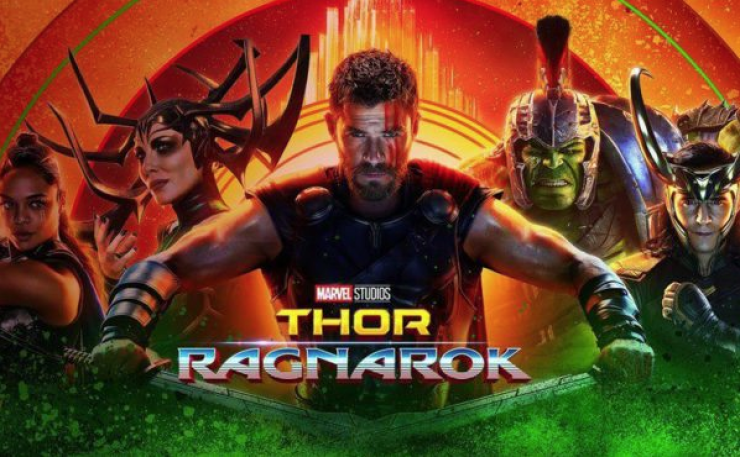The Venn diagram between Christians and comic book geeks will have a fairly large area of crossover. So when a new Marvel film is released, AND it turns out to be packed with theological themes and references, those of us who sit in that sweet spot are pretty much in movie heaven. No prizes for guessing at this point that Thor Ragnarok, the latest instalment in the ever-expanding franchise, is exactly that film.

Indie director Taika Waititi has taken some pretty bold creative choices in his leap from small-but-brilliantly-crafted comedy to blockbuster epic. A gorgeously weird soundtrack (by independent film score legend Mark Mothersbaugh) straight out of 1970s sci-fi and visuals that evoke cult classic Flash Gordon already set the film apart from the rest of the Marvel Cinematic Universe (MCU). But perhaps the most significant decision of all is to redirect the far-too-serious Thor series into full-on comedy territory. Aside from its many other virtues, first of all Ragnarok is just hilariously funny, and while a few of the previous MCU films have successfully married action and laughs, I can't remember one with a hit rate this good.
As any romantic will tell you, a good sense of humour goes an awfully long way, and so despite this frequently-bizarre plot about 'gods' fighting across the universe, the sheer relentless entertainment value of the film keeps you hooked throughout. Skilfully weaving together several plot strands from the MCU, Waititi spins a yarn that is about everything and nothing: a necessary link in the overall Avengers story that is simultaneously a high-stakes battle between good and evil, and all your favourite characters enjoying a knockabout comic book romp.
Despite the comedy and the general light touch however, the film is about plenty of things, and as you might expect from a story that purports to show us the 'gods', plenty of the themes are explicitly or implicitly theological. The Marvel universe has long established the idea that the royal family of Asgard (Thor's homeworld) enjoy a god-like status among other, lesser beings, and Ragnarok gives us the Big Picture of their dynasty.
Thor himself (who in the original Thor remember, came to earth as a man so that we might live) is cast as the dividing line between the Old and New Testaments of that story, a 'God of Thunder' but also a prince of peace. We also learn some of the brutal origin story of Asgard, and how Thor's father Odin (Sir Anthony Hopkins) once appeared to be far less benevolent.
Then there's that strange titular word, which references Norse mythology's version of the apocalypse. Not only does the film include Genesis and redemption stories, but it also has its own version of the book of Revelation, complete with end-times prophecy and terrifying antichrist. Cate Blanchett's Hela, as nasty and unforgiving as any villain in the MCU so far, is precisely the opposite of the heroic hammer-wielding liberator: she's the very embodiment of that biblical description of the devil who comes only to steal and kill and destroy (John 10:10).
Like the biblical book of Revelation, the film also offers a profound reflection on church, that wouldn't be out of keeping with John's letters to the seven churches (in Revelation 2-3). The Asgardians are naturally protective of their Promised Land, their physical kingdom. Yet by the end of the film, they've realised that geography and architecture aren't what define a people. Whether intentionally or otherwise, Wahiti and his genius screenwriters have offered their own prophetic statement to a church that seems increasingly unwilling to heed such a lesson.
Beyond all the Christian-critic-pleasing theology though, this is just a really good film. Chris Hemsworth is getting better and better in the lead role, while Tom Hiddleston continues to delight as his mischievous, scene-stealing brother Loki. A supporting cast of actors who could all be heading up their own blockbusters pull their weight for the ensemble cause, while there are a couple of crowd-pleasing cameos alongside nods to Waititi's previous collaborators. While the effects and action sequences that happen around them all are secondary to some good storytelling, they're all delivered well, including a pulsating opening battle and a physics-defying chase sequence.
The one word of warning is that despite its 12A rating and landscape of bright colours and caped characters, Thor Ragnarok is no kids' movie. There's plenty of real darkness within the froth and frivolity, and the body count is both huge and sometimes created by gruesome means. One death – a grisly melting delivered by the otherwise-hilarious Jeff Goldblum – is particularly unpleasant and quite scary, while the language and ongoing violence of the film make it really quite unsuitable for children. It's not necessarily a weakness of the film, but I'm certain some parents will find it an unsettling experience after the comparably kid-friendly Spider-man: Homecoming. I certainly wouldn't take a child under 12 to see it.
Taika Waititi won't have set out to make a reverential film – at least, not one that bows to the Christian tradition. Yet like so many stories that tackle the big ideas of good against evil, origin and apocalypse, it naturally strays into biblically resonant territory, and with a similar outcome. As a result he's not only delivered one of the very best Marvel films so far, but also one that offers some very Kingdom-minded insights. Those of us who sit in the middle of that Christian/Comic Book Venn diagram could scarcely imagine a more perfect experience.
Martin Saunders is a Contributing Editor for Christian Today and the Deputy CEO of Youthscape. Follow him on Twitter @martinsaunders.




